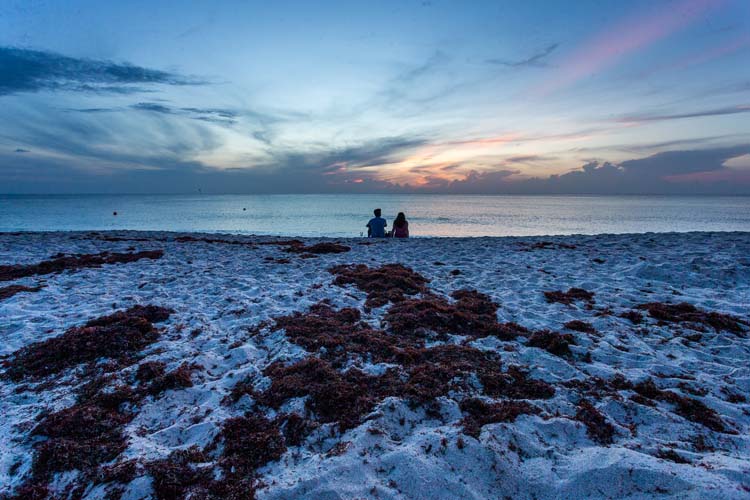
If you’ve plopped your folding chair down at South Beach or Conn Beach lately, you may have had to weave your way through thickets of stinky, maize-colored seaweed covering some of the sand to find a good spot. The seaweed washes in with the tide and doesn’t always wash out again.
It’s sargassum – a non-toxic, floating algae common in the Atlantic, Caribbean and Gulf of Mexico that’s usually beneficial to the marine environment.
But when it comes ashore in tennis court-sized mats several feet thick, as it’s doing right now in several Caribbean countries, it can smother baby sea turtles emerging from their nests, cause nearshore fish kills by depleting oxygen levels in the water, and send gagging beachgoers packing.
The problem isn’t too bad on Vero’s beaches – the Gulf Stream, which carries sargassum north from the Caribbean, is further offshore here than it is further south – but summer is far from over.
“What we’re seeing now over a large area is too much of a good thing,” Dr. Brian LaPointe, research professor at Florida Atlantic University’s Harbor Branch Oceanographic Institute in Fort Pierce, said.
“We’re not seeing the massive pileup that the Caribbean is seeing, but things can get worse here too,” he added.
The algae floats around in the open ocean at the mercy of winds and currents, and its growth is fueled by nitrogen and phosphorus from land-based sources, mainly septic systems and fertilizer runoff.
There really isn’t much that people along the Treasure Coast can do to hold back the seaweed from the beach.
The sea turtle nesting season, which runs from March through October, is at its peak right now, and raking the beaches with mechanical devices is illegal.
“We have no way of removing it [during turtle season],” said Vero Beach City Manager Jim O’Connor. “It’s a natural phenomenon of living on the ocean.
“One day, it’ll be bad and the next day it isn’t. If you happen to live in a condo and it comes up behind your condo, then it’s a national crisis.”
O’Connor said regular beach maintenance using an ATV pulling a claw-like device will resume after the turtle nesting season is over.
Article by: Sue Cocking



